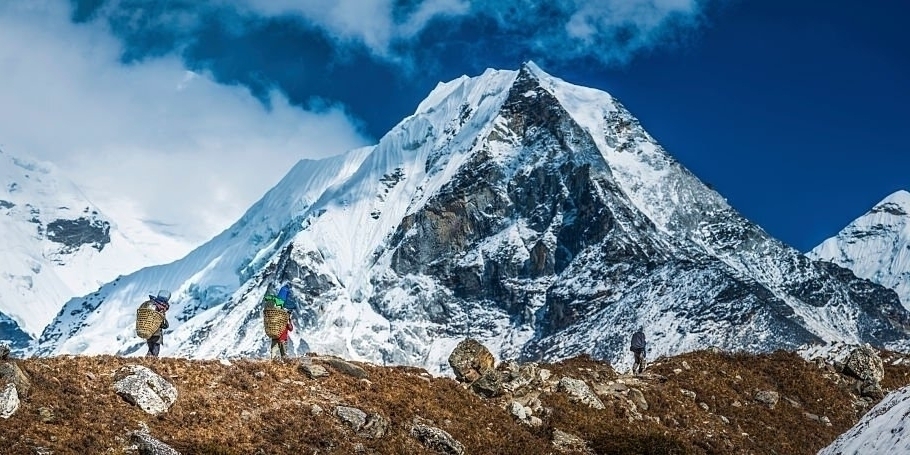


A journey across the spectacular Himalayas, where old mountains scrape the sky and magnificent views await at each turn, has been a dream of many travelers. For those who enjoy both trekking and climbing, the EBC trek with Island Peak climbing is the ideal combination—a journey that guarantees an incredible odyssey of a lifetime.
Imagine entering a dimension where nature's majesty has no bounds and your spirit of discovery is sparked. The EBC trip provides the framework, taking you through charming villages, old monasteries, and tranquil alpine views. You'll be following in the footprints of climbing legends as you walk up the renowned trail to Everest Base Camp.
But the adventure doesn't finish there; it's only the warm-up for an even more enormous task and reward: climbing Island Peak. At 6,189 meters, this beautiful summit is a beacon of appeal, attracting both seasoned adventurers and first-time climbers. You'll be armed with the abilities and self-assurance needed to achieve the peak thanks to the instruction of expert Sherpas and the encouragement of fellow explorers. Standing at the top of Island Peak, encircled by Himalayan giants, is an incredible feeling that words can barely describe.
While this expedition offers spectacular views and unique experiences, beginners frequently wonder, "How safe is this trek and climb for someone with limited experience?" In this blog, we'll go through the safety aspects of the EBC expedition with Island Peak climbing, answering the worries of first-timers who dare to walk into this realm of awe. We'll learn about the necessary safeguards, the importance of physical planning, and the skill of professional guides who make this incredible voyage not only possible but also profoundly enriching. So buckle your virtual seatbelt and get ready to be enchanted by the appeal of the EBC trek with Island Peak climbing—a collision of beauty, difficulties, and glory that will eternally etch itself into the heart of your adventurous soul.
The EBC trek with Island Peak climbing is a challenging yet rewarding adventure that takes between 18 and 21 days to finish. The trip begins with the classic Everest Base Camp trek, which takes participants through breathtaking landscapes, attractive towns, and the Sherpa people's rich cultural legacy. Trekkers arrive at Everest Base Camp, a dream destination for many adventurers, as they adjust to the increasing altitude.
Following the EBC Trek, the expedition continues with the ascent of Island Mountain (Imja Tse), a breathtaking mountain rising 6,189 meters (20,305 feet). Island Peak is a popular choice for first-time climbers since it provides a great introduction to the world of Himalayan mountaineering and requires basic technical skills and physical stamina.
Adequate physical fitness is essential for newcomers attempting the EBC trek with Island Peak climbing. Participating in aerobic exercises, weight training, and endurance activities for several months before the trip can greatly improve one's ability to withstand the rigorous voyage. Furthermore, visiting a medical practitioner and undergoing a full health check-up is essential to verify that one is physically and mentally prepared for the rigors of high-altitude hiking and climbing.
Altitude sickness is a legitimate risk with any high-altitude excursion or climb. The EBC journey including Island Peak climbing provides adequate possibilities for acclimatization due to the route's gentle ascents, rest days, and required intermediate altitude rests. Pacing carefully and following the advice of expert guides can help reduce the incidence of altitude-related diseases.
Selecting a reputable trekking firm with skilled guides and Sherpas could make a huge difference in guaranteeing participant safety. Seasoned guides have in-depth knowledge of the terrain, weather patterns, and altitude issues, and can provide essential advice and assistance throughout the trek.
Having the proper gear and equipment is critical for participant safety and comfort. The climbing section, includes high-quality hiking boots, down coats, sleeping bags, crampons, harnesses, and helmets. Beginners should obtain professional guidance or assistance in selecting and using the proper equipment.
Choosing the right time for the trek is critical. The EBC trek including Island Peak climbing is best done in the spring (March to May) and autumn (September to November), when the weather is reasonably stable and visibility is superb. Avoiding the monsoon and harsh winter months reduces the hazards connected with bad weather.
The EBC Trek with Island Peak climbing appeals to the daring spirit in all of us. It provides a challenging, awe-inspiring, and tremendously satisfying experience. We can tackle the Himalayas as beginners, with adequate preparation and instruction, and create memories that will last a lifetime. So, let us embrace the fascination of this extraordinary journey and carry its lessons of perseverance and discovery with us on all of our future excursions. The mountains will always be there, beckoning us to scale their heights and explore the limitless possibilities that lay outside our comfort zones. Happy hiking, and may the spirit of the Himalayas inspire our search for new frontiers forever.
